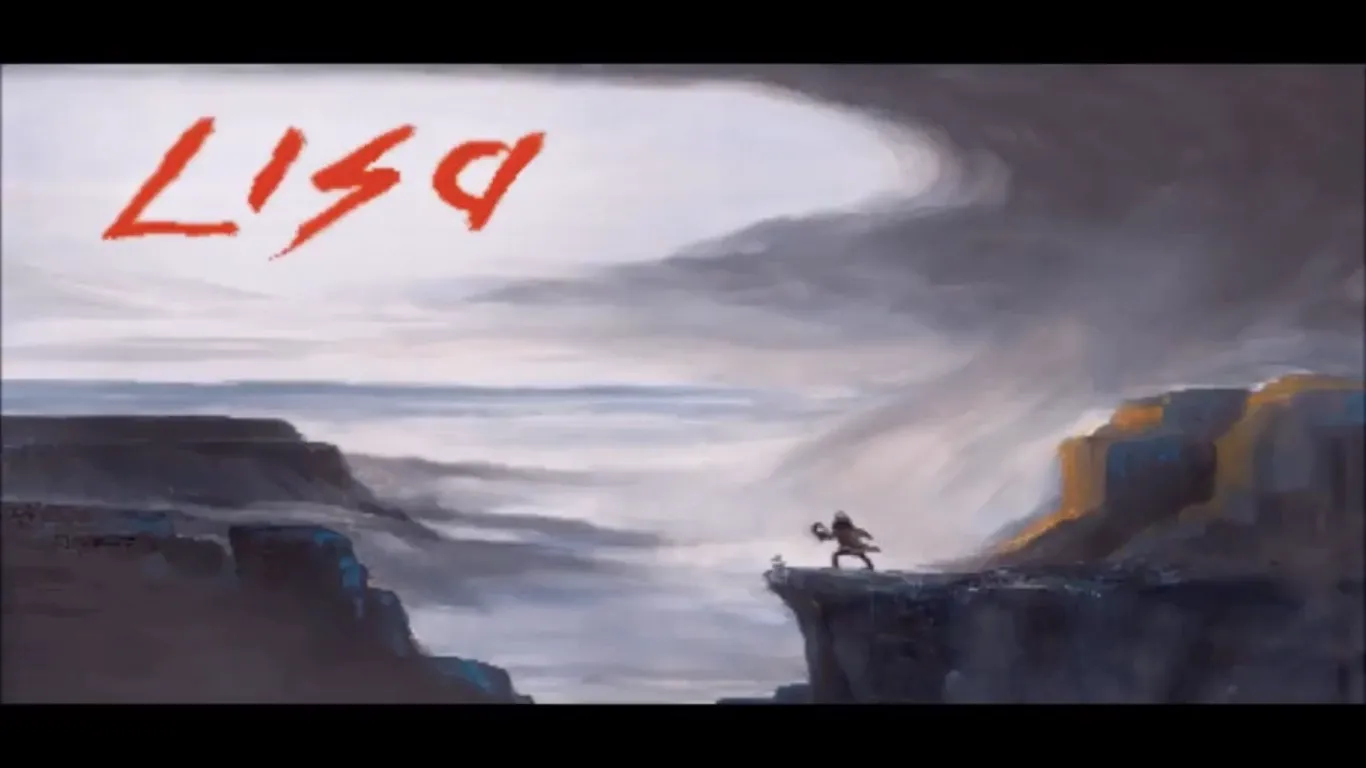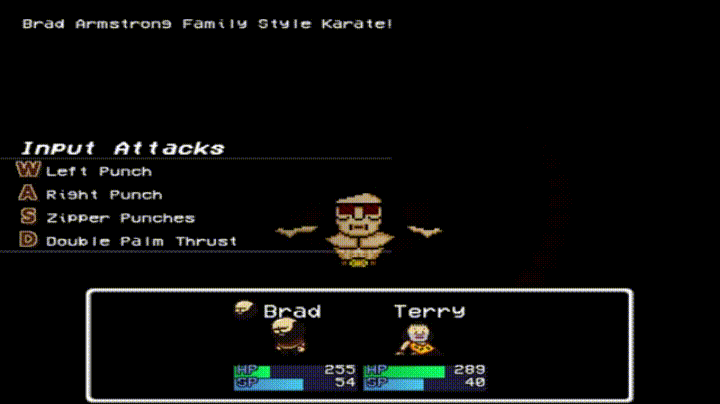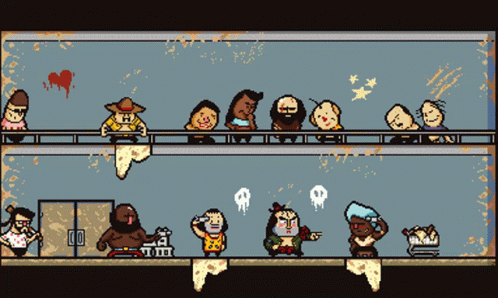Bromances and Frenemies — Feminism and Trauma in LISA: The Painful, Part 2
Part 2 of our examination of the post-apocalyptic RPG about toxic masculinity


Welcome to Olathe, a sunburnt post-apocalyptic wasteland where men suffer in silence, gangs are in constant war, and women are nowhere to be found. Except Buddy, a girl who, when we left off in Part 1, has been kidnapped from the care of her adopted father, the tortured Brad Armstrong. Now Brad is on a mission to save his daughter, but he can’t do it without his friends.
Brad is complicated, and we see this through both his gameplay and his interactions with the recruitable allies. LISA’s gameplay gives the player interactive access to Brad Armstrong’s morally gray mindset in his single-minded goal to save Buddy. In his mind, this will atone for his failure to save his sister, Lisa, from his father’s abuse.
The Irony of Armstrong Style
Brad, a retired martial arts sensei, is a deadly one-man army due to his signature “Armstrong Style” technique. In-game, the technique allows the player to input button combinations in the vein of Street Fighter, which makes Brad use his, well, strong arms to strike up to five times in a single turn. Successful button combinations result in devastating combos, like Buster Punches, Machine Gun fists, or even fireballs which the game describes as “blasts of flaming emotion.”

As a narrative device, Armstrong Style helps us better understand Brad’s psyche. Brad’s role as a sensei is itself a defense mechanism in a cruel world, where Brad attempts to use physical violence as a tool for protection, but ends up replicating the same power structures instead. The Youtuber Hbomberguy in his video essay on LISA perfectly describes Brad’s subsequent character motivation. “When she’s kidnapped from Brad’s care … Brad immediately takes it as a justification for perhaps what he’s been training for his entire life: a rampage in which all he does is try to protect someone he sees as vulnerable.”
If Armstrong Style is a metaphor for how Brad derives masculine agency through his body, then the power-obsessed world he lives in counters that this is something that stronger men can take away through bodily violence if Brad refuses to conform. On two occasions, the game forces the player to choose between a party member’s life or removing one of Brad’s arms. Brad is a powerhouse with two arms, but a one-armed Brad significantly limits his damage potential, making every boss fight that much tougher. With no arms, Brad's body has been taken away by force, physically becoming a shell of what he once was among party members who have now outclassed him.
Depending on the player’s choices, Brad can be emotionally strong but physically weak, or physically strong but selfish. The irony that Brad finds inner strength from compassion — but is punished severely for it — is not lost on me. Through LISA’s gameplay, Armstrong Style shows us that male bodily autonomy is systemically policed and constrained, afforded only to those who conform to hegemonic masculinity. This enforcement is restricted to taking what you want no matter the cost and overpowering everyone in the way, but not being emotionally sensitive and standing up to protect those who cannot protect themselves.

It's easy to see how, under constant threat, many men would choose the path of least resistance thanks to lifetimes of negative reinforcement. For every time Brad shows compassion and starts to get better, there are two other times Brad is a bully who uses strength to control others. After Buddy’s abduction, Brad recruits party members through, at best, loyalty, but frequently through intimidation, coercion, and outright blackmail.
The Bros: Brad and the Men who Love Him
LISA’s most effective statement on Brad’s role as a dual victim and perpetrator of toxic masculinity is in how subtle moments endear you, the player, to Brad and his companions, while simultaneously conditioning you to make sociopathic choices.

For example, early in the game, Brad gets hit by a truck and wakes up restrained by Columbo’s gang — Brad’s schoolyard bullies at the start of the game. The player is then made to choose between losing all their hard-earned items or sacrificing the life of their first companion, Terry Hintz. Novice players sometimes go through the entire game believing Terry is useless. His attacks do virtually no damage, and his special abilities are random positive affirmations with effects not clearly labeled in the game. Meanwhile, enemies hit hard, and healing items are rare. The firebomb item vastly outpaces Terry in damage output. There’s no reason to keep Terry around, other than the fact that he’s a genuinely nice guy. So you might save him, but you considered giving him up, didn’t you? Will that resolve last when the next sacrifice happens? What’s more important, a weak cuckold who’s a liability to your goals, or a woman? What’s your breaking point, hero?
Beyond just Terry, LISA features a massive roster of recruitable allies, who join up for various reasons. Rage Ironhead, an imposing luchador whom I never recruit out of disgust, makes it clear he’s only helping Brad for the opportunity to double-cross him and have sex with Buddy. Brad wins the loyalty of a rival gang leader, Buffalo Van Dyke, after showing his strength in besting all of Buffalo’s gang companions.
Others aren’t as willing to join. Take Rooster Coleman, who’s content with his simple life raising chickens and doesn’t want anything to do with the rest of the world’s “pervert war.” Brad can blackmail him into joining by holding his prize hen, Goldie, for ransom. Or how about Crisp Ladaddy, who’s just enjoying life with his adorable boyfriend Toby? Crisp conscientiously objects to the use of pornographic magazines as financial currency (yeah, that’s a thing) and is doing just fine on his own… until Brad takes Toby as ransom.

There are also friendly companions who joined because, for whatever reason, they genuinely enjoy Brad’s company. Brad and Olan Hoyt bonded after sharing a cold one and telling stories. Brad found the drunkard Birdie Hall wasting away in some bar, but Birdie’s experiences with Brad seem to have helped him move on from the death of his two sons. None can forget Nern Guan, the kooky historian whose obsession with the apocalyptic flash's origin is matched only by his love of sweet lemon tea. Since Brad, in a deconstructive twist on the silent protagonist trope, rarely speaks through the game, it’s hard to know how one-sided these interactions might be. Still, every once in a while, these party members give us subtle reminders that Brad has his moments of genuine affection, and might have been fully connected to his empathetic self if the world had been different.
But the biggest diamond in the rough is my man Terry Hintz. Remember everything I just said about Terry being a useless party member? Well, if you understand his quirks and learn his strategies, he’s actually far-and-away the best character in the game. Hbomberguy says “Terry Hintz might genuinely be one of the best pieces of game design in the last 10 years,” and I have to agree, but not just for gameplay reasons. The fact that he gets mistaken as useless is a genius literary decision that speaks volumes about masculinity.

Terry is amazing, and I love him. He’s just a dork who goes around posting informational signs (which are in-game tutorials) all around the world just to help people out because he’s a bro. He has his moments of self-doubt, but while everyone thinks he’s a loser, he has incredible self-esteem. He starts hanging around Brad because he “seems pretty lonely” and just wants to give him company. On his hint boards, he signs his name in unmasculine nicknames like “Terr Bear” and “Sweet Terry Wine,” but then also as “T-Man.”
One of his abilities, “Cool Pose,” has the description “Makes you feel cool, but you’re really not,” yet he sure owns it. By the end of the game, Terry is one of the characters who call Brad out and tries to stop his rampage, even though they become best friends, and even though Brad is physically stronger because he knows it’s the right thing to do. Despite everything, Terry is Terry. And that’s really beautiful. In a way, he exemplifies an even better masculine ideal: kindness, generosity, emotional openness, a fun spirit, non-competitiveness, and amazing self-confidence without bravado.

Similarly, Terry's abilities have hidden depths, to the point where most new players routinely overlook him. He’s no fighter, but he’s a superb support character. He can set up incredible stat buffs and is a competent healer. But most importantly, his debuffs are godly, the best of which prevents enemies from using perma-death attacks. This is crucial for ensuring long-term survivability. While he seems like a trash-tier character, perhaps even a failure of a man, Terry is the difference between players who struggle and the ones who find success in any battle. Terry separates the men from the boys.
So you’ve got lots of companions: the bromances and the frenemies, and all of this makes him a complex character, reinforcing his role as an everyman who embodies the dualism of masculinity. Simultaneously, Brad is a cruel mob lord and a cherished friend, a beneficiary and victim of traditional patriarchy, a villain, and a tragic hero.
This dynamic is most impactful during Brad’s most difficult sacrifice: Russian Roulette. Before the midpoint of the game, Brad is kidnapped by a psychopath in a hat who’s gotten rich off forcing people to play Russian roulette against their will. Brad does not participate, (un)bravely volunteering as tribute to coach his squad. He chooses which of his allies go first, and must keep playing until his henchmen win three times or everyone besides him dies, whichever comes first. No matter what, though, Brad gets to leave alive.

Disturbingly, the scene gets the player into the same psychological headspace as Brad. His goal above all is to save Buddy, and yours, as the player, is to beat the game. Whose life do you volunteer first? Given how brutally difficult the game has been thus far, friends are a liability. So you prioritize saving the strong over the weak. You might pick the weakest allies or the ones you haven’t known very long, such as Fardy Hernandez or Percy Monsoon. Then the numbers start to dwindle. If you haven’t mastered the game mechanics, you might panic and feel like you have to pick Terry next. Sure, he’s a pal, but it just doesn’t make sense to choose such a weak man in favor of the heavy hitters. Is Terry Hintz really worth starting the entire game again for if he’s your only line of defense against the tough battles coming up? Many will say no, prioritizing the creep Rage Ironhead. The Russian roulette scene is a disturbing acknowledgment of how strength is prioritized above all else in LISA’s hyper masculinized world, even when it seems like Brad might have formed genuine bonds.
And that’s really sad, right? This isn’t a world where the comfort of friends is permitted. It’s ultra-competitive, kill or be killed, or lose everything you think you want most out of life by more dangerous men who want it more. Brad is an outcome of an oppressive environment, and though we see the occasional touching moment between Brad and the boys, the quest to save Buddy usually makes Brad a worse person.
In the next article, I’ll explore the gangs of Olathe to show they send Brad further and further down the cycle of abuse, making Buddy’s life harder in the process.
